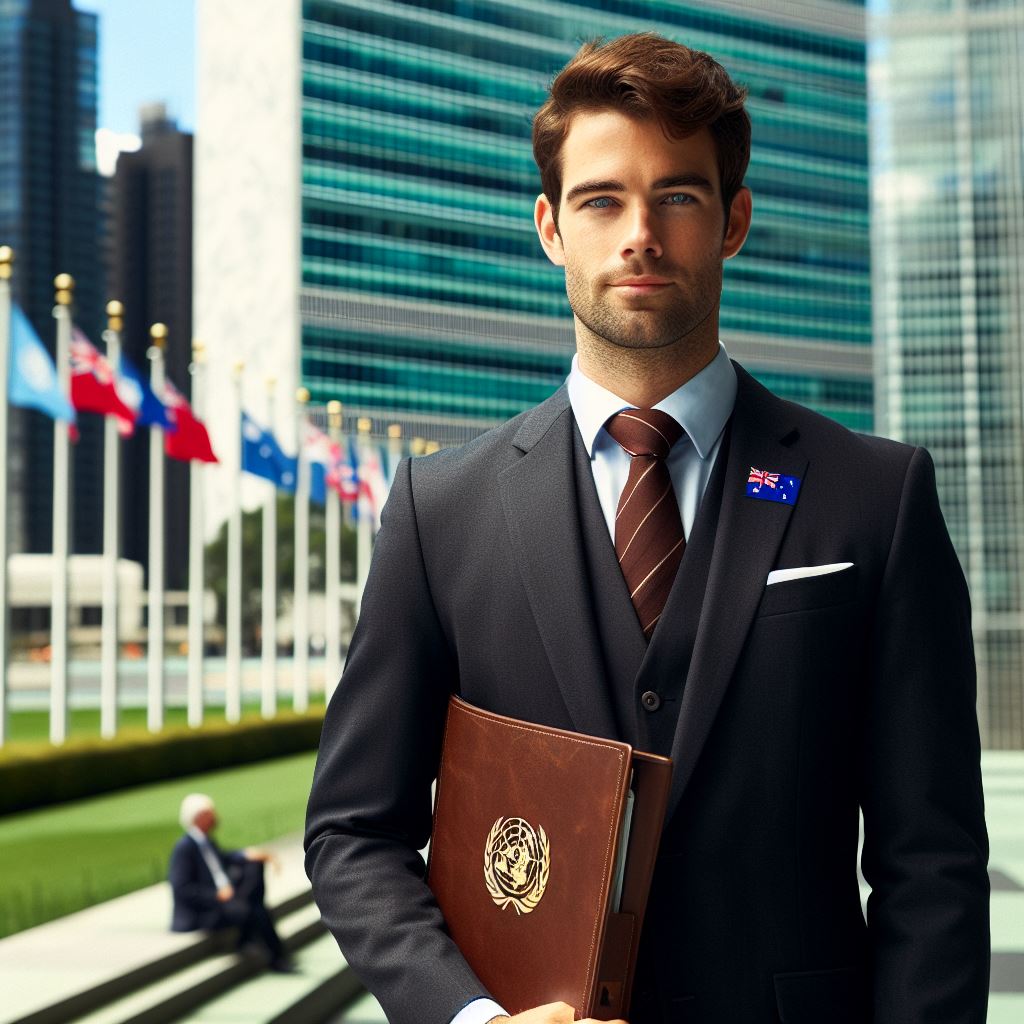Introduction
Diplomacy is the practice of managing international relations and negotiations between countries.
Diplomats play a crucial role in today’s world, ensuring peaceful resolutions and maintaining global stability.
This blog post aims to identify and discuss the challenges faced by diplomats in current times.
Diplomacy is the art of negotiation between countries to maintain peace and foster cooperation.
It involves representing and promoting a nation’s interests while engaging with foreign governments.
Diplomats act as intermediaries, facilitating dialogue and resolving conflicts.
In our increasingly interconnected world, diplomats serve as crucial agents of global politics and international cooperation.
They work towards shared goals, including addressing global challenges such as climate change, terrorism, trade regulations, and human rights issues.
This blog post aims to shed light on the numerous challenges diplomats face in their demanding roles.
By addressing these challenges, we can better appreciate the complexities of diplomatic work and the importance of their contributions to international affairs.
Diplomats confront a range of obstacles in their day-to-day work.
These include navigating cultural differences, managing conflicting interests, cybersecurity threats, balancing political agendas, and adapting to rapidly evolving global dynamics.
As diplomats confront the challenges posed by an ever-changing international landscape, it is essential to recognize and appreciate their tireless efforts.
Their diplomatic skills and negotiation expertise contribute to building bridges, fostering collaboration, and maintaining stability in our world.
Stay tuned for our upcoming blog posts, where we delve deeper into the specific challenges faced by diplomats and explore potential solutions.
Historical context: Challenges faced by diplomats in the past
In the course of history, diplomats have encountered various challenges that have tested their skills and abilities. These challenges have often shaped the course of international relations and set the stage for future diplomatic practices.
Briefly discuss challenges faced by diplomats in history
- Wars and conflicts have been a major challenge for diplomats throughout history. They have had to navigate complex negotiations and find peaceful resolutions to prevent further bloodshed.
- Communication barriers were also prevalent in the past, making it difficult for diplomats to convey their messages and understand the intentions of other nations.
- Cultural differences and misunderstandings have posed significant challenges for diplomats. Different norms, values, and belief systems often led to conflicts that required delicate diplomacy to resolve.
- Unstable alliances and shifting power dynamics created a challenging environment for diplomats. They had to constantly adapt their strategies and build new relationships to maintain stability.
- Technology limitations hindered effective communication and prevented diplomats from gathering timely and accurate information. This made decision-making more difficult and diplomacy less efficient.
Diplomatic immunity and its significance
Diplomatic immunity has played a significant role in shaping diplomatic practices throughout history. It is a concept that provides protection to diplomats and enables them to perform their duties without fear of harassment or interference.
The significance of diplomatic immunity lies in the fact that it allows diplomats to engage in open and honest dialogue, even during times of conflict.
Without this protection, diplomats would be vulnerable to legal action or coercion, which would hinder their ability to represent their respective nations effectively.
Diplomatic immunity also fosters trust and mutual respect between nations. It ensures that diplomats can freely express their opinions and negotiate without the fear of personal repercussions.
This freedom is essential for productive diplomatic negotiations and the resolution of conflicts.
Examples of historical conflicts and negotiations
Throughout history, diplomats have faced numerous conflicts and engaged in intricate negotiations to find resolutions. Some notable examples include:
- The Treaty of Westphalia (1648): This treaty marked the end of the Thirty Years’ War and established the principle of diplomatic immunity. It laid the foundation for modern diplomatic practices.
- The Congress of Vienna (1814-1815): Following the Napoleonic Wars, diplomats from major European powers gathered to redraw the map of Europe and restore stability in the region.
- The Cuban Missile Crisis (1962): Diplomatic negotiations between the United States and the Soviet Union prevented a potential nuclear war and eased tensions during the Cold War.
- The Iran Nuclear Deal (2015): Diplomats from various nations negotiated an agreement with Iran to restrict its nuclear program, easing global concerns and promoting stability in the region.
These examples illustrate the vital role diplomats play in resolving conflicts, preventing wars, and maintaining peace in the international arena.
In fact, diplomats have always encountered numerous challenges in the course of history. From navigating wars and conflicts to overcoming communication barriers and cultural differences, their role is vital in shaping international relations.
With diplomatic immunity providing protection and enabling honest negotiations, diplomats have historically played a pivotal role in resolving conflicts and promoting peace.
Read: Fire Service Ranks in Australia Explained
Globalization and fast-paced world
The challenges faced by diplomats in today’s globalized and fast-paced world are numerous and complex. Globalization has had a profound impact on diplomacy, presenting diplomats with new obstacles and opportunities.
One of the main ways in which globalization has affected diplomacy is through increased interconnectivity and communication challenges.
With the advent of the internet and social media, information travels at an unprecedented speed and reaches a global audience instantly.
Diplomats must now navigate a virtual world where their every move is scrutinized and analyzed. This poses a challenge because any misstep can have far-reaching consequences.
Need for diplomats to keep up with rapid changes
Furthermore, the rapid pace of technological advancements has meant that diplomats need to constantly keep up with changes in order to effectively navigate the global landscape.
With new communication platforms and tools emerging constantly, diplomats must stay updated and adapt to these changes quickly. Failure to do so can result in a loss of relevance and effectiveness.
Another challenge faced by diplomats today is the need to address complex global issues that are interconnected and transnational in nature.
Global challenges such as climate change, terrorism, and economic inequality require collaborative and multifaceted solutions.
Diplomats must work across borders and engage in diplomacy that goes beyond traditional bilateral relationships. This demands a nuanced understanding of global dynamics and the ability to build alliances and coalitions.
Requirements of diplomacy in today’s world
Additionally, diplomacy in today’s world requires diplomats to be more flexible and adaptable.
Traditional diplomacy relied on long and structured negotiation processes, often taking months or even years to reach an agreement.
In today’s fast-paced world, however, diplomats need to be able to respond quickly to emerging crises and changing circumstances.
This calls for agile and dynamic diplomacy that can address urgent issues and find timely solutions.
Moreover, diplomats today face the challenge of managing the often conflicting interests of different stakeholders.
In a globalized world, there are a multitude of actors and organizations with diverse agendas and priorities.
Diplomats must navigate this complex landscape and strike a balance between competing interests in order to achieve their diplomatic objectives.
In a nutshell, globalization and the fast-paced world have presented diplomats with a range of challenges.
Increased interconnectivity and communication challenges, the need to keep up with rapid changes, addressing complex global issues, the requirement for flexibility and adaptability, and managing diverse stakeholders are just some of the hurdles diplomats face.
However, with effective strategies and an understanding of the evolving global dynamics, diplomats can overcome these challenges and continue to play a crucial role in shaping international relations.
Read: Firefighting Gear: What Do They Really Wear?
Your Personalized Career Strategy
Unlock your potential with tailored career consulting. Get clear, actionable steps designed for your success. Start now!
Get StartedPolitical challenges
Today, diplomats face several political challenges as they navigate through their role in the international arena:
- Political instability in certain regions: Diplomats must deal with the repercussions of unstable governments or conflict-ridden areas.
- Unpredictable and evolving geopolitical landscape: The global political landscape is constantly changing, posing challenges for diplomats to adapt and respond accordingly.
- Navigating through complex international relations: Diplomats have to navigate the intricacies of relationships between countries, balancing their own national interests with diplomacy.
Political instability in certain regions
Political instability in certain regions can greatly hinder the work of diplomats. Countries with unstable governments or ongoing conflicts often present difficulties in maintaining diplomatic relations.
Diplomats must carefully assess the situation and adapt their approaches to ensure effective communication and progress.
Unpredictable and evolving geopolitical landscape
Moreover, the unpredictable and evolving geopolitical landscape further adds to the challenges faced by diplomats today.
Shifts in power dynamics, emerging global issues, and changing alliances require diplomats to constantly remain informed and flexible in their strategies.
They must anticipate and respond to these changes promptly to protect their country’s interests.
Navigating through complex international relations
One of the key roles of diplomats is to navigate through complex international relations.
Diplomats act as mediators, negotiators, and facilitators between countries with different goals and priorities.
This requires exceptional diplomatic skills and a deep understanding of cultural, political, and historical contexts.
They also need to strike the delicate balance between pursuing their own country’s interests and promoting international cooperation and collaboration.
In addition to these political challenges, diplomats also face several practical obstacles in their daily work.
These include language barriers, limited access to information, and bureaucratic procedures.
Overcoming these hurdles requires diplomats to develop strong communication skills, establish reliable networks, and possess a diplomatic acumen that allows them to navigate through bureaucratic systems effectively.
Furthermore, the rise of technology has presented both opportunities and challenges for diplomats.
While it has facilitated communication and information sharing, it has also opened new avenues for cyber-attacks and espionage.
Diplomats must be aware of these risks and take necessary measures to ensure the security and integrity of their communications.
Overall, diplomats today encounter a range of political challenges as they work to represent their countries’ interests and foster international cooperation.
Political instability, evolving geopolitics, and intricate international relations require diplomats to be adaptable, knowledgeable, and skilled in order to effectively fulfill their roles.
Read: The Future of Firefighting in Australia

Economic challenges
- Economic disparities between countries
- Negotiating trade agreements and resolving economic disputes
- Balancing national interests with global economic cooperation
Diplomats today face numerous challenges in navigating the complex world of international economics.
Economic disparities between countries
One of the key economic challenges that diplomats encounter is the existence of significant economic disparities between countries. These disparities can create tensions and imbalances in global economic relations.
Diplomats must address these issues and work towards improving economic cooperation and reducing the disparities.
Negotiating trade agreements and resolving economic disputes
Negotiating trade agreements is another critical task for diplomats.
In an interconnected global economy, countries rely on trade to foster economic growth and development.
Diplomats play a crucial role in facilitating trade negotiations and ensuring that agreements are fair and mutually beneficial.
However, these negotiations often involve complex issues and competing interests that diplomats must carefully navigate.
Inevitably, economic disputes arise between nations.
Diplomats are responsible for resolving these conflicts through dialogue, compromise, and mediation.
Such disputes can range from disagreements over tariffs and market access to intellectual property rights and investment disputes.
Diplomats must employ their negotiation skills and diplomatic tact to find amicable solutions that uphold the interests of all parties involved.
Balancing national interests with global economic cooperation
Furthermore, diplomats must balance their nation’s interests with the need for global economic cooperation.
Nations strive to protect and promote their own economic well-being, but they must also recognize the interdependency of the global economy.
Diplomats face the challenge of finding common ground and fostering cooperation among countries while safeguarding their own national interests.
These economic challenges necessitate diplomats to possess a diverse set of skills and knowledge.
Effective communication, negotiation, and an understanding of economic principles are crucial in addressing these issues.
Diplomats must also stay updated on the latest economic developments and trends to effectively represent their countries in economic fora.
Addressing economic challenges requires diplomats to work collaboratively with various stakeholders, including government officials, business leaders, and representatives of international organizations.
Cooperation and coordination among diplomats are essential to find solutions that promote economic stability, growth, and fairness.
In general, diplomats face significant economic challenges in the modern world.
Economic disparities, trade negotiations, economic disputes, and balancing national interests with global cooperation all require diplomats’ careful attention and skills.
By addressing these challenges effectively, diplomats can contribute to fostering a more prosperous and equitable global economy.
Read: How Technology Aids Aussie Firefighters
Technological challenges
In today’s rapidly changing world, diplomats face a multitude of challenges, including those posed by technology.
Technology has revolutionized every aspect of our lives, and diplomacy is no exception. However, along with the benefits come unique challenges that diplomats must navigate in order to effectively carry out their duties.
Impact of technology on diplomacy
The advent of technology has significantly impacted diplomacy, altering traditional practices and introducing new avenues for engagement. Diplomats now have to adapt to the rapidly evolving digital landscape.
- Increased transparency: Technology has made it easier for individuals and organizations to access information, making diplomacy more transparent than ever before.
- Accelerated communication: The Internet and various communication platforms have revolutionized the speed at which diplomats can exchange information and engage in dialogue.
- Expanded reach: Through social media and digital platforms, diplomats can reach a wider audience, extending their influence and impact.
- Cultural understanding: The accessibility of technology has allowed diplomats to engage with individuals from different cultures and societies, fostering greater understanding and cooperation.
Cybersecurity threats and digital diplomacy
While technology offers new opportunities, it also brings significant cybersecurity threats that diplomats must address.
Stand Out with a Resume That Gets Results
Your career is worth more than a generic template. Let us craft a resume and cover letter that showcase your unique strengths and help you secure that dream job.
Get Hired- Hacking and cyber attacks: Diplomats face the constant threat of cyber attacks, which can compromise sensitive information and disrupt diplomatic relations.
- Digital surveillance: The increased reliance on technology for communication exposes diplomats to surveillance by both state and non-state actors, compromising their privacy and undermining their work.
- Disinformation and fake news: The proliferation of false information online poses a challenge to diplomats, who need to verify and respond to misinformation in real-time.
- Public opinion manipulation: Technology has given rise to platforms that can be exploited to manipulate public opinion and sway diplomatic negotiations.
Utilizing technology for effective communication and information sharing
Diplomats must leverage technological advancements to enhance their communication and information sharing capabilities.
- Virtual meetings: Video conferences and virtual meetings have become invaluable tools for diplomats, enabling efficient communication without the need for physical presence.
- Remote diplomacy: Thanks to technology, diplomats can work remotely, reducing travel costs and increasing flexibility in their work schedules.
- Big data analysis: Diplomats can utilize big data analysis to gain insights into global trends and public sentiment, informing their decision-making processes.
- Collaborative platforms: Technology allows diplomats from different countries and organizations to collaborate on shared platforms, enhancing coordination and joint efforts.
In summary, technology presents both opportunities and challenges for diplomats in today’s world. Diplomacy must adapt to the rapidly evolving technological landscape in order to effectively address these challenges and utilize the benefits technology has to offer.
Legal challenges
The world is constantly evolving, and with it, the challenges faced by diplomats today. One major challenge is navigating the complex landscape of international laws and treaties.
Diplomats must have a deep understanding of these legal frameworks to effectively represent their country’s interests on the global stage.
International laws and treaties serve as the foundation for international relations, providing a set of rules and guidelines that govern interactions between nations.
Diplomats must familiarize themselves with these laws to ensure that their country’s actions are in compliance. Failure to do so can result in strained diplomatic relations and even legal consequences.
Dealing with legal disputes and conflicts
Dealing with legal disputes and conflicts is another challenge diplomats encounter. Disagreements between nations can arise due to a variety of factors, such as territorial disputes, trade disagreements, or human rights violations.
Diplomats play a crucial role in negotiating and mediating these conflicts, working towards a mutually beneficial resolution.
Resolving legal disputes requires strong diplomatic skills, including effective communication, negotiation, and compromise. Diplomats act as intermediaries between conflicting parties, facilitating dialogue and finding common ground.
This can be a delicate and challenging process, as they must balance their own country’s interests with the need for a peaceful resolution.
Ensuring compliance with international legal frameworks
Ensuring compliance with international legal frameworks is yet another challenge faced by diplomats.
It is not enough to simply be aware of international laws and treaties; diplomats must ensure that their country complies with these obligations.
This often requires collaboration with various government agencies and stakeholders to implement policies and practices that align with international standards.
Compliance with international legal frameworks extends beyond domestic policies and practices.
Diplomats must also ensure that their country’s actions on the global stage are in accordance with international law.
This can be particularly challenging in cases where there may be differing interpretations or conflicting interests among nations.
To navigate these legal challenges, diplomats rely on diplomatic immunity, a privilege granted to them that ensures they are protected from legal prosecution in the host country.
This immunity allows diplomats to carry out their duties without fear of legal repercussions, fostering open and honest dialogue between nations.
In essence, diplomats face numerous legal challenges in today’s complex world.
International laws and treaties shape the foundation of their work, requiring a deep understanding and adherence to these legal frameworks.
Dealing with legal disputes and conflicts, as well as ensuring compliance with international law, are crucial tasks that diplomats must navigate.
These challenges demand strong diplomatic skills and the ability to balance national interests with the need for peace and cooperation.
Despite the difficulties, diplomats play a vital role in shaping international relations and promoting the rule of law on the global stage.
You Might Also Like: Women in Australian Law Enforcement
Cultural challenges
Cultural differences can pose significant challenges for diplomats in their efforts to build relationships and negotiate agreements. Diplomats must navigate a complex landscape of social norms, traditions, and values, which can vary widely across different cultures.
One key challenge is the need for cultural sensitivity. Diplomats must be aware of and respectful towards the customs and traditions of the host country. This requires a deep understanding of the cultural context and the ability to adapt their behavior and communication style accordingly.
Language barriers also present a significant challenge. Diplomats often work in multilingual environments, where effective communication can be hindered by linguistic differences.
Translating complex diplomatic concepts accurately can be challenging and can lead to misunderstandings if not done properly.
Building trust and fostering understanding in diverse societies
Building trust and fostering understanding in diverse societies is another critical challenge for diplomats.
In culturally diverse settings, diplomats must find common ground and bridge gaps to create mutual understanding and trust.
This requires strong interpersonal skills, empathy, and the ability to appreciate different perspectives.
To address these challenges, diplomats can employ various strategies.
First and foremost, diplomats must invest time and effort in understanding the cultural intricacies of the host country.
This includes studying its history, traditions, and value systems.
Cultural training programs and language courses can also help diplomats enhance their cultural competence and language skills.
Networking and building personal relationships with people from different cultures is also crucial.
By engaging with local communities, diplomats can develop a deeper understanding of the cultural nuances and gain the trust and respect of the host country’s citizens.
To overcome language barriers, diplomats can rely on professional interpreters and translators.
These language experts play a vital role in facilitating effective communication between diplomats and their counterparts.
Diplomats should also strive to learn key phrases and expressions in the local language to demonstrate respect and willingness to engage with the host culture.
In fostering understanding and building trust, diplomats should prioritize active listening and empathy.
This means being open-minded, respecting diverse viewpoints, and seeking common ground.
Offering cultural exchanges, promoting educational programs, and facilitating people-to-people connections can also contribute to fostering understanding and building trust between countries.
In fact, diplomats face numerous cultural challenges in today’s diplomatic landscape.
Cultural sensitivity, language barriers, and the need to build trust in diverse societies all require diplomats to adapt and develop new skills.
By investing in cultural understanding, language proficiency, and interpersonal relationships, diplomats can overcome these challenges and successfully navigate the complex world of international diplomacy.
Environmental challenges
In today’s world, diplomats face numerous challenges when it comes to addressing global environmental issues. These challenges include the need to negotiate climate change agreements and balance economic development with environmental sustainability.
One of the main challenges faced by diplomats is the task of addressing global environmental issues.
With the increasing threat of climate change and the depletion of natural resources, diplomats play a crucial role in finding solutions to these problems.
Transform Your LinkedIn for Maximum Impact
Elevate your professional brand with a LinkedIn profile that attracts recruiters, showcases your expertise, and maximizes opportunities. Stand out in your industry with a profile built for success.
Boost ProfileNegotiating climate change agreements is another significant challenge that diplomats face. With different countries having their own priorities and interests, reaching a consensus on how to combat climate change can be a complex and arduous process.
Diplomats must engage in extensive negotiations to ensure that all countries are willing to commit to reducing greenhouse gas emissions and adopting sustainable practices.
Balancing economic development with environmental sustainability
Furthermore, diplomats are tasked with the difficult job of balancing economic development with environmental sustainability. As countries strive for economic growth, it often comes at the expense of the environment.
Diplomats must find ways to promote economic development while also ensuring that it does not harm the planet or exacerbate existing environmental issues.
Strategies and approaches
To tackle these challenges, diplomats employ various strategies and approaches. Here are some examples:
- Multilateral Cooperation: Diplomats work towards fostering multilateral cooperation by bringing together countries from around the world to collaborate on environmental issues. This involves organizing international conferences and forums where countries can discuss and negotiate environmental agreements.
- Diplomatic Negotiations: Diplomats engage in diplomatic negotiations to reach agreements on climate change and other environmental issues. This involves conducting diplomatic talks and meetings with representatives from different countries to address concerns and find common ground.
- Capacity Building: Diplomats also focus on capacity building initiatives to assist countries in developing their capabilities to address environmental challenges. This includes providing technical assistance, knowledge sharing, and resources to countries that might lack the necessary expertise or resources.
- Public Diplomacy: Diplomats employ public diplomacy techniques to raise awareness and encourage public support for environmental sustainability. This can involve outreach programs, media campaigns, and diplomatic speeches to educate the public about the importance of environmental conservation.
Essentially, diplomats face several challenges when it comes to addressing global environmental issues.
From negotiating climate change agreements to balancing economic development with environmental sustainability, diplomats play a crucial role in finding solutions to these complex problems.
Through multilateral cooperation, diplomatic negotiations, capacity building, and public diplomacy, diplomats strive to address these challenges and create a sustainable and prosperous future for all.
Explore Further: International Relations: A Diplomat’s View
Uncover the Details: Behind the Scenes: Staff Roles in Politics
Learn More: Retirement Plans for Police Officers
Conclusion
Basically, diplomats today face numerous challenges that require skilled and adaptable individuals.
The ever-changing international landscape demands diplomats who can navigate complex political, economic, and social issues.
Additionally, diplomats must also grapple with the rise of technology and its impact on diplomacy.
The importance of skilled and adaptable diplomats cannot be overstated.
They need to possess excellent communication, negotiation, and problem-solving abilities.
Diplomats must also be culturally sensitive and able to understand the nuances of different societies and customs.
Moreover, they must be able to effectively represent their countries and protect their interests on the global stage.
Looking to the future, the role of diplomacy will continue to evolve.
Globalization and technological advancements will likely continue to shape the nature of diplomacy.
Diplomats must be prepared to face new challenges and adapt to changing circumstances.
In closing, the challenges faced by diplomats today are vast and multifaceted.
Skilled and adaptable diplomats are crucial in addressing these challenges and safeguarding their nations’ interests.
As the world becomes more interconnected, diplomacy will remain a vital tool in resolving conflicts, promoting cooperation, and fostering peace.
Thus, it is imperative to invest in diplomatic training and education to ensure diplomats can effectively navigate the complexities of our rapidly changing world.




